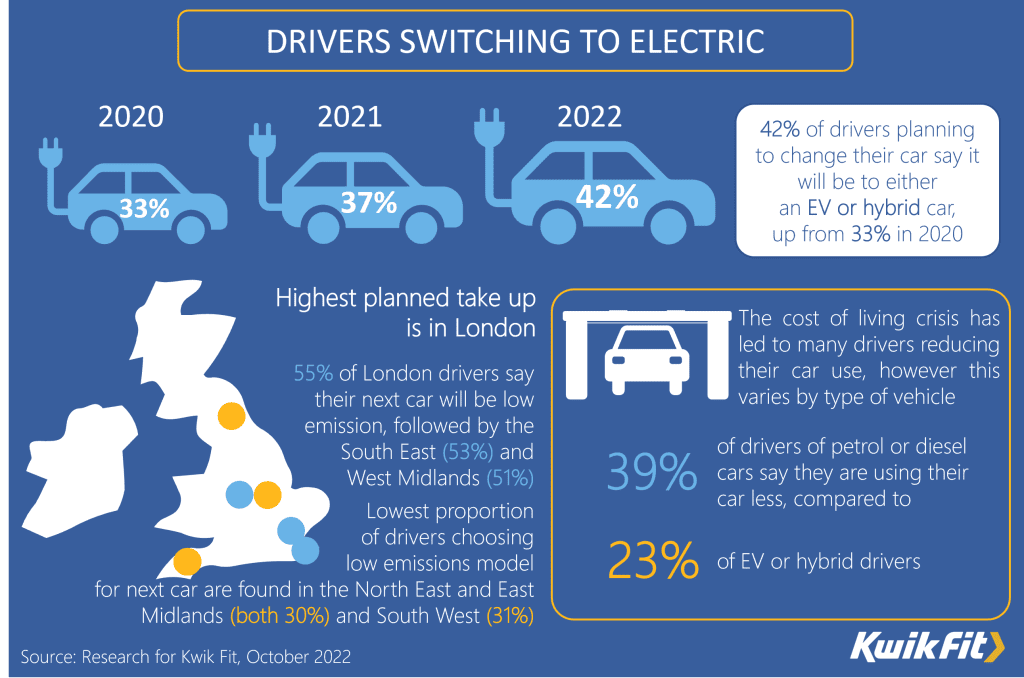New data as part of a study for Kwik Fit shows that an increasing number of drivers are thinking about a switch to electric vehicles (EV).
A total of 42% of respondents to the company’s study said they think their next vehicle will be a low-emission vehicle, either hybrid or EV. This is a significant increase on 12 months ago, when 37% said they planned to switch. In 2020, it was 30%, meaning numbers are increasing rapidly.
In contrast, 34% of those planning to change their car said they will opt for a petrol or diesel engine next time, with 24% saying they don’t know. The figures indicate that in the last year, approximately 800,000 additional drivers have decided that they will opt for a low emissions vehicle for their next car.

These drivers will help increase plug-in vehicle registrations from the current figure of one in five new cars in the UK. However, there are still many motorists not yet ready to make the switch and Kwik Fit’s research reveals the biggest factors putting people off. The most common reason given is the rise in electricity costs, cited by 39% of those who are not considering switching to fully electric for their next car. (The research was carried out after the Government announced its emergency energy price cap.)
After the rising cost of electricity, the reasons given most often by car owners for not switching to a full EV are the purchase cost compared to equivalent sized internal combustion engine (ICE) alternatives, concerns over range on a single charge and the lack of fast charging points in the areas they commonly drive.
Cost-of-living has an impact
The cost-of-living crisis has led to many drivers using their car less. However, this varies dramatically depending on the type of vehicle. Of those with an ICE car, 39% say they have decreased the use of their car, compared to the much lower figure of 23% for hybrid or EVs.
The cost-of-living crisis has had an impact on the motoring expenditure of more than two thirds (68%) of drivers. After using their car less (36% of all drivers), the next most common consequence is owners saying that they have delayed changing their car and are keeping it for longer than originally planned, stated by one in five drivers (19%). In good news for road safety and emissions, as well as in reducing costs, 13% of drivers say they are driving more slowly to save on fuel.
In contrast to those keeping their car for longer, almost one in 10 (9%) say they have swapped their car for a more economical model. The figures indicate that many have switched to EVs or hybrids, 27% of those currently driving low emission vehicles say that switching to a more economical model was driven by the cost-of-living crisis.
Some 8% of drivers say they have put off servicing their car to save money, and while this will be of immediate benefit, it may be a false economy in the longer term. Regular servicing will not only help keep a car running efficiently and reduce fuel consumption, a full service history can also add to a car’s resale value.
Roger Griggs, communications director at Kwik Fit, said: “It is clear that after reaching a tipping point last year when for the first time, more people told us that they were going to buy electric than ICE, the trend has continued. It’s understandable that the rise in electricity costs has caused concern among some drivers, but EVs remain much cheaper to run and the long-term direction of travel is clear. Industry and government must work together to ensure that drives have the confidence to make the switch.
“However, it is obvious that the car parc of the UK will be a mix of ICE hybrid and EVs for many years to come, so it’s vital that drivers are supported in making sure their car runs as efficiently as possible, whatever type of fuel it uses.”




You must be logged in to post a comment.